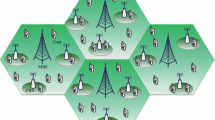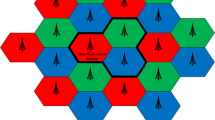Abstract
We study algorithms for carrier and rate allocation in cellular systems with distributed components such as a heterogeneous LTE system with macrocells and femtocells. Existing work on LTE systems often involves centralized techniques or requires significant signaling, and is therefore not always applicable in the presence of femtocells. More distributed CSMA-based algorithms (carrier-sense multiple access) were developed in the context of 802.11 systems and have been proven to be utility optimal. However, the proof typically assumes a single transmission rate on each carrier. Further, it relies on the CSMA collision detection mechanisms to know whether a transmission is feasible. In this paper we present a framework for LTE scheduling that is based on CSMA techniques. In particular we first prove that CSMA-based algorithms can be generalized to handle multiple transmission rates in a multi-carrier setting while maintaining utility optimality. We then show how such an algorithm can be implemented in a heterogeneous LTE system where the existing Channel Quality Indication mechanism is used to decide transmission feasibility.





Similar content being viewed by others
References
3GPP TR 36.921. Evolved Universal Terrestrial Radio Access (E-UTRA); FDD Home eNode B (HeNB) Radio Frequency (RF) requirements analysis.
Andrews, M., Capdevielle, V., Feki, A., & Gupta, P. (2010). Self-organizing and self-optimizing networks. Bell Labs Technical Journal, 15(3), 85–97.
Borst, S., Markakis, M., & Saniee, I. (2011). Distributed power allocation and user assignment in OFDMA cellular networks. In Proceedings of the 49th annual allerton conference on communication, control, and computing, Monticello, Illinois.
Borst, S. C., Ghaderi, J., & Whiting, P. A. (2012). Backlog-based random access in wireless networks: Fluid limits and instability issues (invited paper). In Proceedings of CISS 2012 and WiOpt 2012.
Chen, C.S., Baccelli, F., & Roullet, L. (2011). Joint optimization of radio resources in small and macro cell networks. In Proceedings of IEEE Vehicular Technology Conference, pp. 1–5.
Ghaderi, J., & Srikant, R. (2010). On the design of efficient CSMA algorithms for wireless networks. In Proceedings of CDC.
Ghaderi, J., & Srikant, R. (2012). Effect of access probabilities on the delay performance of Q-CSMA algorithms. In INFOCOM.
Hou, I., & Gupta, P. (2011). Distributed resource allocation for proportional fairness in multi-band wireless systems. In Proceedings of the IEEE international symposium on information theory.
Jiang, L., & Walrand, J. (2008). A CSMA distributed algorithm for throughput and utility maximization in wireless networks. In Proceedings of the conference on communication, control and computing.
Karn, P. (1990). MACA—A new channel access method for packet radio. In Proceedings of the 9th ARRL computer networking conference, London, ON, Canada.
Kelly, F. (1979). Reversibility and stochastic networks. Chichester: Wiley.
Lee, J., Yi, Y., Chong, S., Nardelli, B., Knightly, E., & Chiang, M. (2012). Making 802.11 dcf optimal: Design, implementation, and evaluation. CoRR, abs/1207.3740.
Liu, J., Yi, Y., Proutiere, A., Chiang, M., & Poor, H. V. (2010). Towards utility-optimal random access without message passing. Wireless Communications and Mobile Computing, 10, 115–128.
Proutiere, A., Yi, Y., Lan, T., & Chiang, M. (2010). Resource allocation over network dynamics without timescale separation. In INFOCOM.
Qian, D., Zheng, D., Zhang, J., & Shroff, N. (2010). CSMA-based distributed scheduling in multi-hop MIMO networks under SINR model. In INFOCOM.
Rajagopalan, S., Shah, D., & Shin, J. (2009). Network adiabatic theorem: an efficient randomized protocol for contention resolution. In Proceedings of SIGMETRICS/Performance 2009, pp. 133–144.
Shah, D., & Shin, J. (2010). Delay optimal queue-based CSMA. In Proceedings of SIGMETRICS 2010, pp. 373–374.
Son, K., Lee, S., Yi, Y., & Chong, S. (2011). Refim: A practical interference management in heterogeneous wireless access networks. CoRR, abs/1105.0738.
Stolyar, A. L., & Viswanathan, H. (2009). Self-organizing dynamic fractional frequency reuse for best-effort traffic through distributed inter-cell coordination. In Proceedings of IEEE INFOCOM 2009.
Author information
Authors and Affiliations
Corresponding author
Additional information
A preliminary version of the paper appeared in the 11th Intl. Symposium on Modeling and Optimization in Mobile, Ad Hoc, and Wireless Networks (WiOpt) 2013.
Rights and permissions
About this article
Cite this article
Andrews, M., Zhang, L. Utility optimization in heterogeneous networks via CSMA-based algorithms. Wireless Netw 23, 219–232 (2017). https://doi.org/10.1007/s11276-015-1149-z
Published:
Issue Date:
DOI: https://doi.org/10.1007/s11276-015-1149-z




